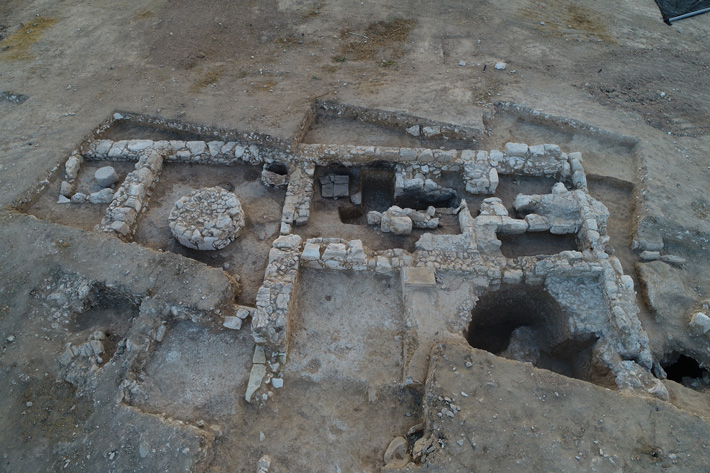1,200-Year-Old Soap Factory Unearthed in Negev Desert
Israel’s earliest soap factory, dating back approximately 1,200 years, was uncovered in the Bedouin city of Rahat, the Israel Antiquities Authority reported on Sunday.
According to the report, hundreds of local youths were involved in the IAA dig, whose purpose was to re-establish the connection between the community and the history of the area.
It is an indication of Islam’s influence in the region, even when it started making roots in Israel, that the soap was made of olive oil. “This city has [deep] Islamic roots and we are proud of these roots,” said Mayor of Rahat Fahiz Abu Saheeben in an IAA Hebrew-language video.
During the Abbasid Era, olive oil soapery was founded, archeologist Dr. Elena Kogen-Zehavi told The Times of Israel. The Abbasids were one of the first Arab rulers to bring Islam to Israel. The soap was a precious product for exports and traveled to Egypt and other Arab lands, she said.
The key to the production of this soap is olive oil as its fatty base, as opposed to the pig fat used in Europe of the same period, which is anathema to Islam.

The Arab conquest of the Holy Land took place in 636, but Islam only became the majority religion in the ninth century. An earlier 2019 excavation in Rahat has shown, however, that Islam came early to this region of the Negev. IAA archaeologists uncovered a rare, very early rural mosque, dating to circa seventh-eighth century CE. It is one of the earliest known examples in the world.
The new find of industrial soap production was uncovered in a large pillared structure that the archaeologists believe belonged to a wealthy family who made its living by soap production, local sales, and potentially even export. The harsh desert conditions, including wind and dust storms, made good personal hygiene a necessity, not just during today’s coronavirus, said Kogen-Zehavi in the IAA video, but also 1,200 years ago.
For millennia, Kogen-Zehavi told The Times of Israel, residents of the Middle East and elsewhere used olive oil in their hygienic practices. She said that while bathing is documented in Babylonian and Greece records, the concept was entirely different. Rather than washing up with a soapy lather, these ancient peoples would anoint themselves in oil, which was scraped off their bodies.
The industrial production of soap only truly began in the Middle Ages in Europe, she said. While Christians could use lard, which was easier to manipulate, making olive oil into hard cakes is much more complicated. The expertise in producing this olive oil soap is carefully guarded until today and passed from generation to generation, said Kogen-Zehavi. A modern olive oil factory in the Arab city of Nablus continues the meticulous ancient methods.

According to the IAA press release, the Rahat complex includes all the facilities needed for the making of olive oil soap. Additionally, researchers were able to obtain organic samples that allowed them to identify materials used in the production process.
The archaeologists found that to make this special soap, olive oil was used as the base and mixed with ashes from the saltwort plants, which contain potash and water.
“The mixture was cooked for about seven days, after which the liquid material was transferred to a shallow pool, where the soap hardened for about 10 days, until it could be cut into bars,” according to the press release. The bars were then dried for a further two months, prior to export.
“This is the first time that a soap workshop as ancient as this has been discovered, allowing us to recreate the traditional production process of the soap industry. For this reason, it is quite unique. We are familiar with important soap-making centers from a much later period – the Ottoman period. These were discovered in Jerusalem, Nablus, Jaffa, and Gaza,” said Kogen-Zehavi in the press release.
Mayor of Rahat Fahiz Abu Saheeben said in the press release that he was pleased “the excavation has revealed the Islamic roots of Rahat.” The dig took place in cooperation with the IAA, the local Bedouin community and the Authority for Development and Settlement of the Bedouin in the Negev, ahead of the construction of a new neighborhood in Rahat. “We hope to construct a visitors’ center that tourists and the local community will be able to enjoy,” said Abu Saheeben.
Assuming the community center is built, in addition to possible souvenirs of ancient olive oil soap, visitors will be able to play one of the two ancient games discovered in an underground chamber at the site.
One of the board games is called the Windmill, a game of strategy known from excavations from the Roman period in the 2nd and 3rd centuries.
The second is a board game with dice or sticks called Hounds and Jackals or 58 Holes, which was played in early Egypt and spread to the Mediterranean and Mesopotamia in circa 2,000 BCE, according to the press release.

